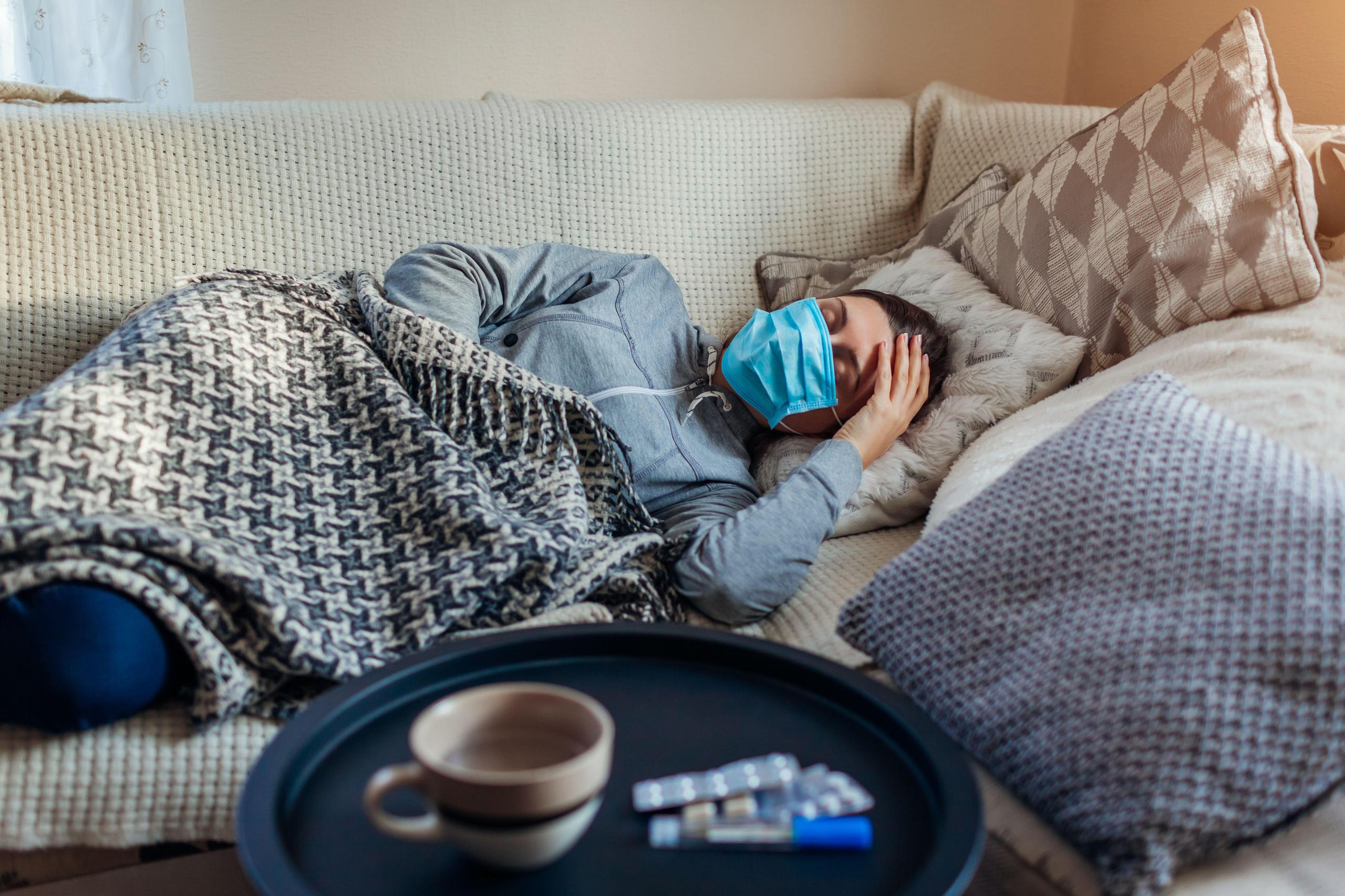
‘Long Covid’ sufferers fight for help and recognition

Since March last year, the Covid-19 pandemic has been at the forefront of everyone’s minds. Whilst most of those that get sick recover quickly from mild flu-like symptoms, the virus has also brought another disease that is still barely on the radar of governments, authorities and doctors: Long Covid.
Chantal Britt is a model of physical and mental toughness. Until recently, the 52-year-old communications specialist and mother of three was an enthusiastic amateur athlete. She ran at least two marathons a year.
That was before the coronavirus pandemic struck. In early March 2020, shortly before the lockdown, Britt took part in a singing event with 800 people. “Five days after that, I was sick for a short time,” she recalls.
What Britt didn’t know at the time – and still doesn’t know now with absolute certainty – is that she contracted Covid-19. Nor could she have known this was the start a period of suffering that continues to this day. No one can tell her, if and when, she will get better.
Britt, who regularly ran many kilometres along the River Aare in Bern, is now worn out after a few flights of stairs. Her pulse shoots up at the slightest exertion. “For almost a year now, walking has been what makes me feel best – I don’t feel myself anymore,” says the marathon runner.
Coined by sufferers
In early May, a good two months after the outbreak of the pandemic in Europe, Paul Garner, a professor at the Liverpool School of Tropical Medicine, was one of the first to describe the symptoms of Long Covid. In a blog postExternal link, he described the protracted aftermath of his own Covid-19 illness as a “rollercoaster ride”.
The largest study to dateExternal link on Long Covid was published on January 8 in the scientific journal The Lancet, and its results are disturbing. A group of Chinese researchers examined the health of nearly 2,500 people hospitalised in the spring for Covid-19 six months later. They found that three-quarters (76%) still have at least one symptom, and almost two-thirds (63%) suffer from fatigue and muscle weakness. Sleep disorders, anxiety attacks, depression and decreased lung capacity (hypofunction) are also common, while 13% suffer from kidney hypofunction.
The term “Long Covid” was coined not by doctors but by people who wanted to describe the aftereffects of their Corona infection. To date, many health authorities and doctors are still not aware of this new disease.
British lead the way
What is happening in the United Kingdom is an exception. The British health authorities have described the disease and created corresponding treatment guidelines. Last May, the British opened the first special clinic for Long Covid patients.
In the United States, renowned immunologist Anthony Fauci, who advised President Trump, assumes that 25% to 35% of all Covid patients will show long-term symptoms.
In Switzerland, there are no official numbers for those suffering from Long Covid. What sufferers lack in particular is official information from the authorities as well as specific treatment and rehabilitation services.
Nevertheless, the long-term consequences of Covid-19 are the subject of three research projects that were launched last August as part of the National Research Programme “Covid-19”.
These projects deal with prognoses based on artificial intelligence and neuropsychological effects of the disease. Studies are also underway at Swiss hospitals, such as the university hospitals of Bern and Zurich.
Completely exhausted
A few weeks after her suspected infection, Britt experienced an incident that alarmed her. As she was cycling up a slight slope on the way to the office to pick up her things to work form home , she had to stop and recover on the pavement. “I was completely exhausted, my heart was racing and I almost couldn’t breathe, she recalls.
Britt does not have a positive test to confirm Covid-19 – it did not exist for fit and healthy people at the beginning of March. However, her family doctor took her complaints seriously and sent her to a lung specialist. He bluntly certified that she had the lung capacity “of an old and overweight woman” who had never done any sport.
A cardiologist also certified that she had heart muscle inflammation. Britt is uncertain whether her lungs and heart will ever recover. She is frightened she will never be able to run again and will have to go through life as an unfit woman.
From isolation to self-help
As a former journalist including as a swissinfo.ch staff reporter, she looked for information to assess her situation and classify her complaints. At the time, she hardly found anything. So together with 43-year-old Florence Isler, also a mother and suffering from a particularly severe form of Long Covid, she founded the self-help group “Long Covid Switzerland” on FacebookExternal link. Together they also launched the website longcovidch.infoExternal link.
Their goal is to offer sufferers initial support and raise public awareness about this new clinical condition. Their demands include the recognition of Long Covid as a disease, better diagnosis, treatment and prevention, as well as consultation hours and support for people with long-term impairments, even for those without a positive Covid-19 test.
The Facebook group has nearly 350 members, aged 17 to 58, and new ones are joining every day. Based on estimates from England, 10% of people that contracted Covid-19 are still not healthy months later. Britt assumes that around 50,000 people in Switzerland have been suffering from more or less severe symptoms since the first wave in March. According to her, it does not seem to make a difference whether the infected person was ventilated in an artificial coma and in intensive care or had only mild orno symptoms.
Britt, Isler and the growing number of fellow campaigners criticise the fact that Switzerland, which has one of the most expensive health systems in the world, still does not provide adequate information and treatment for Long Covid patients after almost a year of the pandemic. “On the homepage of the Federal Office of Public Health, those affected are still searching in vain for information on Long Covid,” says Britt.
Asked to respond, a spokesperson for the FOPH told swissinfo.ch that a policy briefExternal link had been issued by the federal government’s scientific task force on the possible long-term consequences of corona infection, and that various studies were under way.
Extreme fatigue
Prolonged cough
Muscle weakness
Mild fever
Inability to concentrate (“brain fog”)
Memory lapses
Mood swings, sometimes accompanied by depression and other mental health problems
Sleep disturbances
Headaches
Joint pain
Pinprick-like pain in the arms and legs
Diarrhoea and vomiting
Loss of taste and smell
Sore throat and difficulty swallowing
New-onset diabetes and high blood pressure
Skin rash
Shortness of breath
Chest pain
Palpitations
Hair loss
Tooth loss
Source: Wikipedia
Health insurance threat
Instead of recognition and help, those affected are confronted with pressure and threatened restrictions. “There are already efforts by health insurers to exclude Long Covid from coverage by supplementary insurance,” says Britt. The reason for this is that the existing therapies, such as physiotherapy, are not intended for long-term conditions.
Lack of support, insecurity and isolation also add to the burden of those affected. In addition to physical complaints like fatigue, unexplained pain, shortness of breath and stress intolerance, psychological problems such as depression, anxiety and sleeping problems are also typical complaints (see box at the end for more).
In favour of lockdown
Britt does not hide her criticism of the Swiss government. She is currently one of the supporters of a hard lockdown. “In the second-wave, surveys show a majority of the population is in favour of stricter measures. If the Federal Council overrides this, it is not acting democratically,” says Britt. A survey for the Swiss public broadcaster, SBC, in early November found that 54% of respondents were in favour of a short lockdown.
By keeping shops, ski resorts and schools open, the government is putting people at great risk, warns Britt. They could be out of work for months or perhaps even damaged forever. “You can’t have that in a rich country like Switzerland,” she says.

More
Swiss feel gloomy about Covid-19 situation, poll shows

In compliance with the JTI standards
More: SWI swissinfo.ch certified by the Journalism Trust Initiative






























Join the conversation!